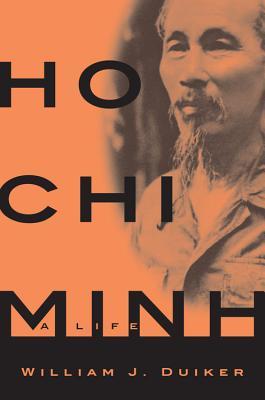
Ho Chi Minh
A Life
کتاب های مرتبط
- اطلاعات
- نقد و بررسی
- دیدگاه کاربران
نقد و بررسی

Starred review from December 4, 2000
It's difficult to think of someone more qualified to write this biography than Duiker (The Communist Road to Power in Vietnam), the retired Penn State University historian who has specialized in the Vietnam War for more than three decades. In his massive, thoroughly researched andDin the mainDquite accessible new biography, Duiker succeeds extremely well in illuminating the life and times of Ho Chi MinhDlong North Vietnam's leader, a man Duiker calls a "master motivator and strategist" and "one of the most influential political figures of the twentieth century." Covering both the personal and political life of the revolutionary leader, Duiker fascinatingly traces Ho's early travels to New York, Boston and Paris, as well as his many years in exile in France, China, Thailand and (during WWII and the war against the French of 1945 to 1954) in the rugged mountains of northern VietnamDeras in Ho's life for which documentation has only recently become available. Duiker's detailed recounting of the momentous and extremely complicated events that took place in 1945 following the Japanese surrender, when Ho Chi Minh's Vietminh revolutionary party seized power in northern Vietnam, is riveting. And his account of the not-always-harmonious relations between Ho and the Communist leaders of China and the Soviet Union probes a subject that has long been overlooked by Western scholars. In the end, Duiker portrays Ho Chi Minh as a fervently anticolonial nationalist who, though a committed Marxist, honestly thought he could count on the United States, which had promised to oppose French colonization after WWII. Referring to a long-raging debate about Ho, he says, "The issue is not whether he was a nationalist or a CommunistDin his own way he was both." 32 pages of b&w photos not seen by PW.

Starred review from September 1, 2000
Neither the cryptic, diabolical enemy nor the icon of the Left, "Uncle Ho" is now the subject of this objective historical study. Vietnam expert Duiker (The Communist Road to Power in Vietnam) here writes the first biography of Ho to use critical sources in Vietnamese, French, Chinese, Russian, and English. His narrative encompasses the last days of the Vietnamese monarchy, in which Ho's father was an official; the French conquest of and attempt to dominate Indochina; the anti-imperialist struggle, aided by Russian and Chinese national and Communist interests; and the career of Ho, who died in 1969, revered by some as the Father of the Revolution and reviled by others as a murderous tyrant. The author carefully sorts out the intricate, often ambiguous evidence, supplying enough background for the interested general reader and enough detail, especially in the extensive notes, for the demanding specialist. Highly recommended for larger collections.--Charles W. Hayford, Northwestern Univ., Evanston, IL
Copyright 2000 Library Journal, LLC Used with permission.

Starred review from August 1, 2000
"He Who Enlightens." That's the translation of Ho Chi Minh--the final and best-known pseudonym taken by one of the most famous revolutionaries of the twentieth century. To this day, the jury is still out on Ho's place in history. Was he merely an agent of the Comintern, acting under orders from Moscow, or a true patriot to his country? The truth, as Duiker uncovers it in this absorbing biography, is both. Uncle Ho, who in his later years affected the look of a Confucian scholar (and in fact was the son of one, and himself a serious scholar before turning to revolution), walked an extremely tricky and narrow path between communism and nationalism. This was no easy task, and as Duiker points out, Ho nearly paid for it with his life in the late 1930s when, while living in Moscow, he was suspected of being a British agent. By then he was the notorious Nguyen Ai Quoc (one of more than 50 pseudonyms Ho would use in his lifetime), who during his 30 years as a Comintern agent would spend time in British and (nationalist) Chinese prisons and receive the death sentence in absentia from the French government in Vietnam. Duiker, who served in the U.S. embassy in South Vietnam during the war, examines Ho's life primarily in the context of his political activity in Paris, Moscow, southern China, and Vietnam, occasionally spiced with anecdotes of Ho's highly secretive personal life. He recounts Ho's well-known early admiration for the U.S. and recounts in part Ho's inaugural speech in Hanoi upon assuming the presidency of North Vietnam in 1945, in which he quoted the Declaration of Independence. Duiker handles the complicated political and diplomatic issues with ease, and his narrative, though it sometimes strays from Ho's life to fill in the bigger picture, never bogs down. ((Reviewed August 2000))(Reprinted with permission of Booklist, copyright 2000, American Library Association.)

























دیدگاه کاربران